Children’s Bible Program – Level 3: Lesson 25 “The Time of the Judges”
/in LivingEd - Youthby Janth English
Read Together: God chose Moses to bring Israel out of Egyptian slavery and to the Promised Land. He then chose Joshua to lead the people into that land and divide their inheritance among the tribes. God chose judges, or leaders, to teach the people His laws and to judge matters that came up according to those laws. Israel was obedient to God for as long as Joshua and the elders that he trained lived. However, after the generation who saw God’s works in the wilderness died, the people began to turn away from God. They wanted to be like the peoples around them, copying their ways and customs. To punish the Israelites for their disobedience, God sent these nations against them. Time after time, Israel suffered under the cruel hand of their enemies. When they cried out to God for relief, he mercifully sent a judge to save them. After a few years of peace, Israel would forget the God who saved them and return to their foreign idols. Again, God would remove His protection and the neighboring nations would invade the land of Israel. For many generations, the people of Israel followed their own rebellious heart, doing what was right in their own eyes.
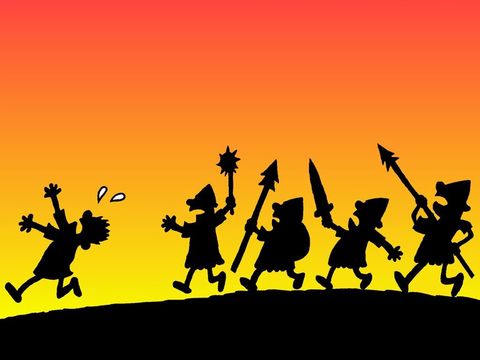
Read Together: Exodus 3:6-10; Deuteronomy 31:7; 1 Samuel 12:12; Judges 2:6-23, 21:25
Discuss:
- Discuss with your child God’s criteria for leadership positions (See Exodus 18:21 and Titus 1:7-8). God’s standards have not changed, and they will not change. Remind your child that they are training now for future leadership positions.
- Discuss with your child Israel’s desire to be like the people around them. Do we sometimes fall into the same trap? What was the result for Israel? What would be the result for us if we do the same thing?
- Point out to your child how God showed mercy to Israel time and again. Help them to see that God’s mercy is forever.
- Discuss with your child the consequences of everyone doing what they think is right. What happens when my thoughts and your thoughts are not in agreement? What happens in society when there are no absolute standards?
Review Memorization.
Judges 21:25 “In those days there was no king in Israel; everyone did what was right in his own eyes.”
Children’s Bible Program – Level 2: Lesson 25 “Jacob and Esau”
/in LivingEd - YouthBy Janth English
Read Together: Isaac and Rebekah lived many years before they had children, but God finally blessed them with twin sons, Jacob and Esau. They were twins, but never were two people more different. Esau was hairy, but Jacob had smooth skin. Esau was a skillful hunter, but Jacob was a mild-mannered shepherd. One day Jacob was cooking lentil stew when Esau came from the fields. He had been hunting and was very hungry. Jacob offered his brother some stew in return for his “birthright blessing”. Esau agreed. Jacob seems quite devious, talking his brother out of his birthright. Remember this, however; Esau cared more about his hunger than his birthright. Many years later, an elderly Isaac decided it was time to bestow a final blessing upon each of his sons. His plan was to give the greater blessing to Esau and a lesser blessing on Jacob, because Esau was his favorite son. Since Rebekah’s favorite son was Jacob, she hatched a plot that would have the greater blessing go to him! This lesson’s reading reveals what happened when their plan unfolded. Though the Bible reveals how weak and deceitful people can be, God’s purpose to establish a nation is still revealed. We’ll learn more about that later.
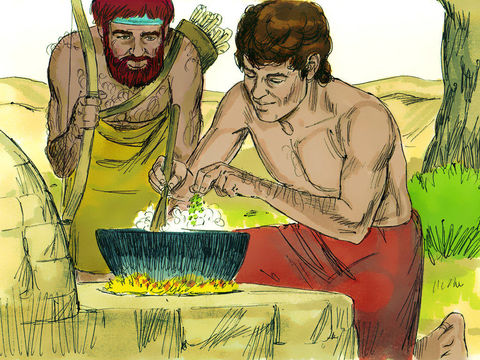
Read Together: Genesis 25:19-34; 27:1-41
Discuss:
- Discuss with your child the ethics of this situation. Since God had chosen Jacob to inherit the promises He made to Abraham and Isaac, was it wrong for Jacob and his mother to use trickery in getting them?
- Discuss with your child the fact that Isaac intended to give the blessings to Esau. Think of a few ways that God could have prevented Isaac from giving the blessings to Esau. Can any human cause God’s plans to fail (Isaiah 46:9-10)?
- Jacob was his mother’s favorite son and Esau his father’s. Ask your child what happens in a family when individual members are shown favoritism.
- Help your child understand that God chooses individuals for His purpose at His time. Explain that God did not choose Jacob because he was somehow “better” than Esau. This principle applies to those who are called now as well.
Review Memorization Genesis 27:29 “Let peoples serve you, and nations bow down to you. Be master over your brethren and let your mother’s sons bow down to you. Cursed be everyone who curses you, and blessed be those who bless you.”
Children’s Bible Program – Level 1: Lesson 25 “Abram Leaves for Canaan”
/in LivingEd - Youth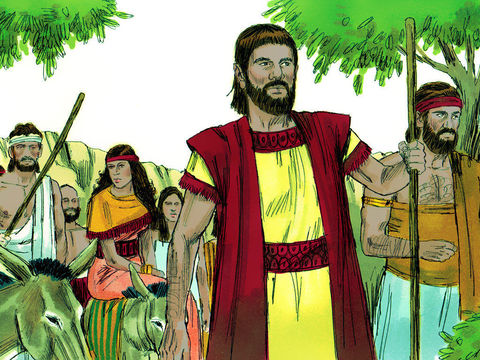
By Janth English
Read Together: Abram was born in the city of Ur in Chaldea which was near the Middle Eastern country of modern day Iraq. He was the son of Terah, who was a descendant of Shem. Shem was one of the three sons of Noah, and lived through the Flood. Abram married his very beautiful half-sister Sarai, but they had no children. Terah left Ur for Canaan and took Abram, Sarai, and Lot, his grandson, with him. For a period of time, Terah and his family lived in Haran, where the Bible tells us that Abram became a very wealthy man. He had gold, silver, livestock and many servants. In time, Terah died, leaving Abram as the leader of the family. His life would change dramatically, however, when, God told Abram to take Sarai and leave Haran. Where was he supposed to go? God told Abram that He would guide him to the right place. In return for his obedience, God promised to make Abram a great nation and to bless all nations through him. At this point in his life, Abram was already 75 years old and had a home and great wealth in Haran. He made the right decision, however, and obeyed God. He took his wife, his nephew Lot, all their possessions and left Haran just as God commanded.
Read Together: Genesis 11:26-32; 12:1-9.
Discuss:
- Show your child where Abram lived and where he traveled (There are many maps available over the Internet.) Talk about how different it would have been to travel over long distances in those days, in comparison to today. People walked and used animals like camels to travel instead of cars!
- Help your child to understand what Abram was willing give up in order to obey God. For Abram and his family, Haran was home. Yet God asked them to leave everything they knew behind.
- Explain to your child that it took faith for Abram to obey God. All he had was God’s word to believe that things would work out.
Review Memorization.
Genesis 22:18. “In your seed all the nations of the earth shall be blessed, because you have obeyed My voice.”
Children’s Bible Program – Level 3: Lesson 24 “The Wave Sheaf—First of the Firstfruits”
/in LivingEd - YouthRead Together: Unleavened Bread always occurred during the barley harvest which was the first of the grain harvests in Israel. God told the Israelites to perform the “wave sheaf” offering each year during the Days of Unleavened Bread. The priests went to the fields as the Sabbath during Unleavened Bread was ending. As the sun was setting, they cut a sheaf of barley and saved it for the ceremony the next day. On the first day of the week, after the Sabbath at about 9:00 am, the priests waved the sheaf of barley as an offering before God. The day when the Wave Sheaf was offered is not a holy day, but it is a ceremony packed full of meaning for Christians. Our Savior, Jesus Christ, was crucified on Passover in 31CE, which was a Wednesday. He was resurrected from the dead exactly three days and three nights later, which was at the end of the Sabbath during the Days of Unleavened Bread, the same time that the grain was cut. The next day, as the priests waved the sheaf before God, Christ ascended to His Father in heaven to offer Himself as the true Wave Sheaf offering. Jesus Christ fulfilled the meaning pictured by the wave sheaf; He became the first of God’s spiritual harvest, the “First of the firstfruits”. He is the firstborn of many brethren. Christ has the preeminence in all things. He is proof that we too can be firstfruits and be born into God’s family as His very own children.
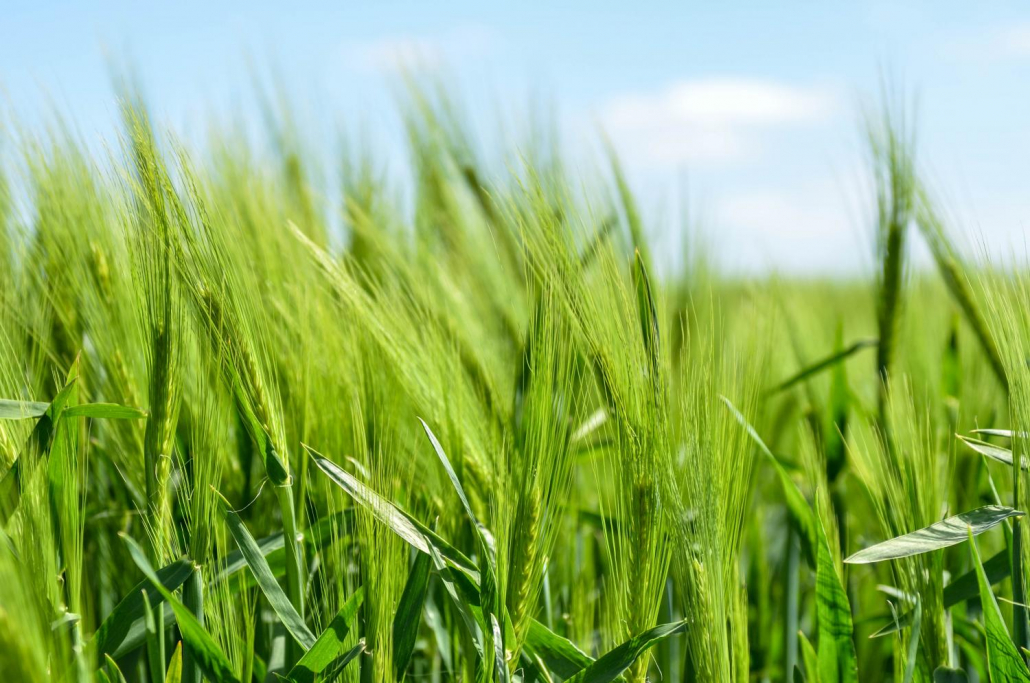
Read Together: Leviticus 23:9–14; Matthew 12:40; John 20:1, 9, 15–17; 1 Corinthians 15:20–23; Romans 8:29–30.
Discuss:
- Discuss what the Bible says about the “wave sheaf” in Lev 23.
- Help your child to create a time chart of the events during the Days of Unleavened Bread in 31 CE. Start with Jesus and the disciples keeping the Passover the Tuesday evening before the crucifixion and ending with His ascension to the Father on Sunday. Count three days and three nights. Christ was in the grave during this time. The chart will help show that He could not have been crucified on Friday and resurrected on Sunday at sunrise as most professing Christians believe. Note that Christ was not in the tomb when Mary Magdalene got there while it was still dark (the sun had not risen).
- Explain to your child in words he/she can understand that a Christian’s hope is in the resurrection. Our destiny, his/her destiny, is to be born as a spirit being into God’s family.
Review Memorization.
Romans 5:10 “For if when we were enemies we were reconciled to God through the death of His son, much more, having been reconciled, we shall be saved by His life.”
Children’s Bible Program – Level 2: Lesson 24 “Eating Unleavened Bread—Putting on Righteousness”
/in LivingEd - YouthRead Together: God told ancient Israel that they were to put out all leavening from their homes, and He also instructed them to eat unleavened bread for seven days. The first and seventh days were to be holy convocations.God’s people continue to observe the Feast of Unleavened Bread by eating unleavened bread for seven days and celebrating the first and seventh days as Holy Days. These days have important meanings in God’s plan for mankind. Passover commemorates Christ’s sacrifice in payment of our sins. The Days of Unleavened Bread picture our effort to put sin out of our lives and replace it with living according to God’s ways. We don’t just avoid doing bad things. We must fill our lives wit good actions, just like our elder brother Jesus Christ.

Read Together: Exodus 12:14–17; Leviticus 23:6–8; Ephesians 4:22–24; John 6:47–51; Galatians 2:20; 2 Timothy 3:16–17; Philippians 1:6; Hebrews 12:2
- Discuss with your child the biblical meaning of righteousness. Read and discuss Psalm 119:172 together.
- Remind your child that the Feast of Unleavened Bread is the only one that has two Holy Days and that Passover is a separate feast but it is not a Sabbath.
- Ask your child to summarize the meaning of the Passover and Days of Unleavened Bread, the first two steps in God’s plan of salvation.
Discuss:
Review Memorization.
1 Corinthians 5:7 “Therefore purge out the old leaven, that you may be a new lump, since you truly are unleavened. For indeed Christ, our Passover, was sacrificed for us.”
Children’s Bible Program – Level 1: Lesson 24 “The Exodus and the Days of Unleavened Bread”
/in LivingEd - YouthRead Together: The Lord told Israel to be prepared to leave when they ate the Passover. He knew that Pharaoh would tell the Israelites to get out of Egypt after the death of their firstborn children. The Egyptians also wanted the Israelites to go away. Before leaving, the Israelites asked the Egyptians for gold, clothing, and things of value, and the Egyptians gave it to them. To prepare for the journey, the people were organized according to their families and tribes, and their armies. Other non-Israelites who had believed Moses and escaped the tenth plague joined with Israel to leave and serve the true God. God also at this time established the Days of Unleavened Bread to commemorate His deliverance of the children of Israel from Egypt. For seven days, Israel was commanded to eat unleavened bread and not have any leavened food in their homes. The night they left Egypt was to be remembered forever as a night of solemn observance. They had to leave so quickly that they did not have time to let their bread rise, so they only had unleavened bread to eat which was in keeping with God’s command. God’s people continue to keep the Feast of Unleavened Bread and the Night to Be Observed as ordained by God. Israel left Egypt with their flocks and their herds, with their silver, gold, and clothing; they left with a high hand. However, God had one more judgment to pass on Egypt. Pharaoh’s heart was hardened and he sent his army to capture Israel and bring them back. With the army coming, mountains on both sides, and the Red Sea at their backs, Israel thought they were trapped, but God opened a path on dry land through the sea for Israel to escape. When Pharaoh’s army attempted to follow the Israelites through the Red Sea, God caused the waters to come over them, and they drowned. God’s judgment was complete just as He had promised Abraham long ago.
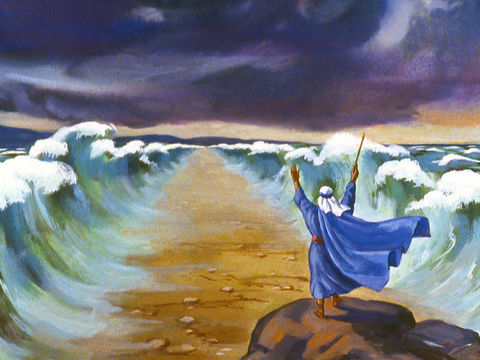
Read Together: Exodus 12–14
Discuss:
- Ask your child how it would feel to walk on dry ground with walls of water as tall as skyscrapers on either side.
- Help your child to understand that it was God who delivered Israel.
- Help your child think about the miracles God worked to free Israel. God destroyed their economy, devastated their military, and reduced their status as a nation. Egypt has never recovered to the status they had before God’s judgment on them.
- Ask your child what he knows about keeping the Days of Unleavened Bread.
Review Memorization:
The Ten Plagues: (1) Waters turned to blood, (2) Frogs, (3) Lice, (4) Flies, (5) Pestilence on the Livestock, (6) Boils, (7) Hail, (8) Locusts, (9) Darkness in the land, (10) Death of the Firstborn
Second Thoughts: It’s for the Kids
/in LivingEd - CharlotteAuthor: Thomas White | Student at LivingEd-Charlotte
“…the Father’s throne is ultimately going to be here on this earth. We look that far out in the future…but for that to be possible, we know that billions of human beings must come up and be taught His way of life, and for them to have the opportunity to become our younger brothers and sisters.” ~ Mr. Ron Poole
Student Assembly | April 11, 2019
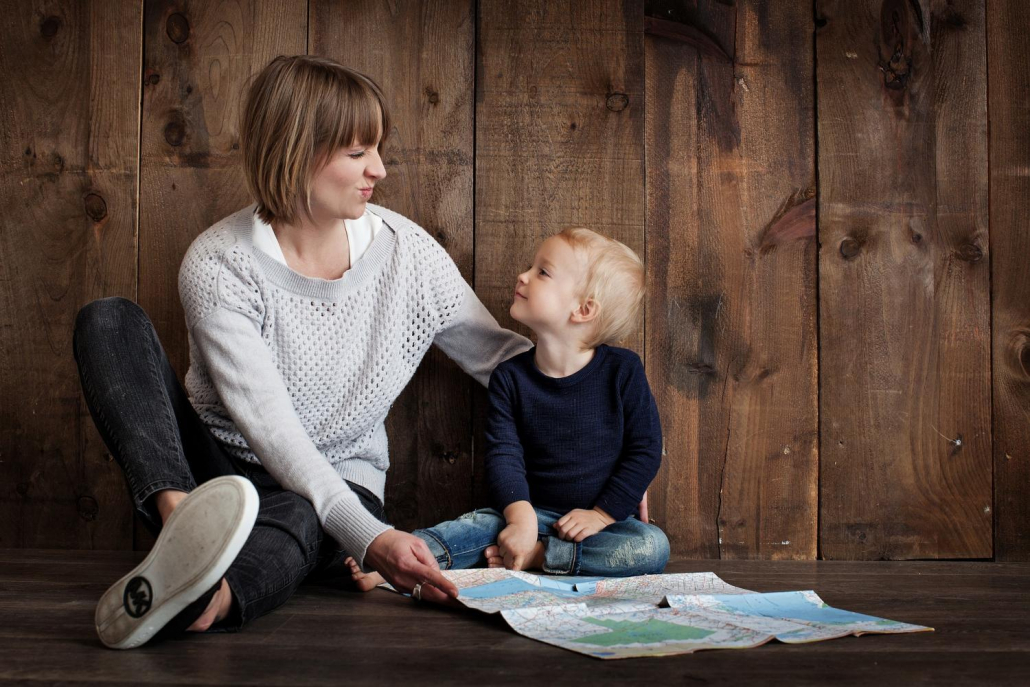
Why do teachers work so hard? Almost all of them will be honest about the fact that they generally don’t get paid much. Whatever level of education they may be involved in, ask any of your best teachers why they put forth so much effort, and I’m willing to bet that most of them would answer with something like, “It’s for the kids. It’s all for the kids.”
This week, Mr. Ron Poole’s assembly reminded me that the future Kingdom we’re striving to reach as unborn children of God, that’s also “for the kids.” It’s our reward, but it’s not only our reward, and I can often undersell it by thinking of it as such. We’re not just running to finish a race, we’re also educating ourselves to try to get a job, the job of a teacher. And one of the bests reasons to be a teacher is to do it for the kids.

“We can see that God has work for us to do. God has a job that He wants us to be able to take care of. He is going to put us to work…but only if we’re ready. It’s only if we’re ready that He will be able to use us.”
As fully born members of the God Family, we’re going to be responsible for the education of untold billions of people, as Mr. Poole poignantly illustrated. How do we make that real to us? How do we motivate ourselves to strive toward that job? “Billions of people” sounds like something out of a statistics class, and I have a very complicated relationship with math, so when I think of being a teacher in the Millennium and Great White Throne Judgment, I focus on three people. One of them is a close family member outside God’s Church, a member I love deeply. Another is someone I knew in college, whose life had been irrevocably damaged by a terrible upbringing. The third is my best childhood friend, a principled and noble individual, who nevertheless was always missing the Truth that would bring his life to a new level. When I think of those people, I am exceedingly motivated to become a teacher, the kind of teacher who heals and enriches his students. Those are my “kids” I want to do it for. Who are yours?
“Would our resumes, starting in chronological order, show that we are growing in the grace and the knowledge of our Lord and Savior, Jesus Christ?”

Whoever your “kids” are, keep them in mind as this life gets hard, because as Mr. Poole said, we’re building our applications for the ultimate teaching position with every decision we make, every opportunity from God that we take advantage of. When we desire something with every ounce of our being, we make sacrifices for it, sometimes painful ones, but the result is always worth the striving. Applying to become one of God’s Teachers is long and arduous, but in our most paralyzing moments of weakness, it might be most helpful to remember that we’re doing it for the kids.

Thomas White was one of the onsite Living Education students for the 2018-2019 semesters. He also has a Bachelor’s Degree in English. Thomas currently works as an Editorial Assistant for the Living Church of God. According to his wife, he eats pizza in entirely the wrong way.
Children’s Bible Program – Level 3: Lesson 23 “The Days of Unleavened Bread”
/in LivingEd - YouthRead Together: The Days of Unleavened Bread begin immediately after the Passover, on the fifteenth day of the first month. For seven days, all of Israel was to have no leaven in their homes and to eat unleavened bread. The first and last Days of Unleavened Bread are Holy Days to the Eternal. During the Days of Unleavened Bread, leavening agents picture sin which causes people to be puffed up with pride and vanity. Putting leavening out of our homes reminds us that we are to put sin out of our lives. When Peter told the Jews that they had crucified the Son of God, they asked what they should do. Because every person has sinned, each of us is responsible for the death of Christ. He had to die to pay the penalty for our sins. When we acknowledge this fact, we face the same question of what to do. Peter’s replied that they must “repent”. We repent of sinning, which is the transgression of God’s law. Repentance means to turn from the way of life that leads to death and to follow God’s way leading to eternal life. Eating unleavened bread for seven days pictures feeding on Christ, the true unleavened bread, in whom dwelt no sin. We feed on Christ by studying His word which transforms our minds. As we do, we begin to be more like Christ. As Dr. Roderick C. Meredith often said, we will begin to think like God thinks, want what God wants, and do what God would do. If we feed on Christ, God will give us eternal life, because He is the “bread of life.”
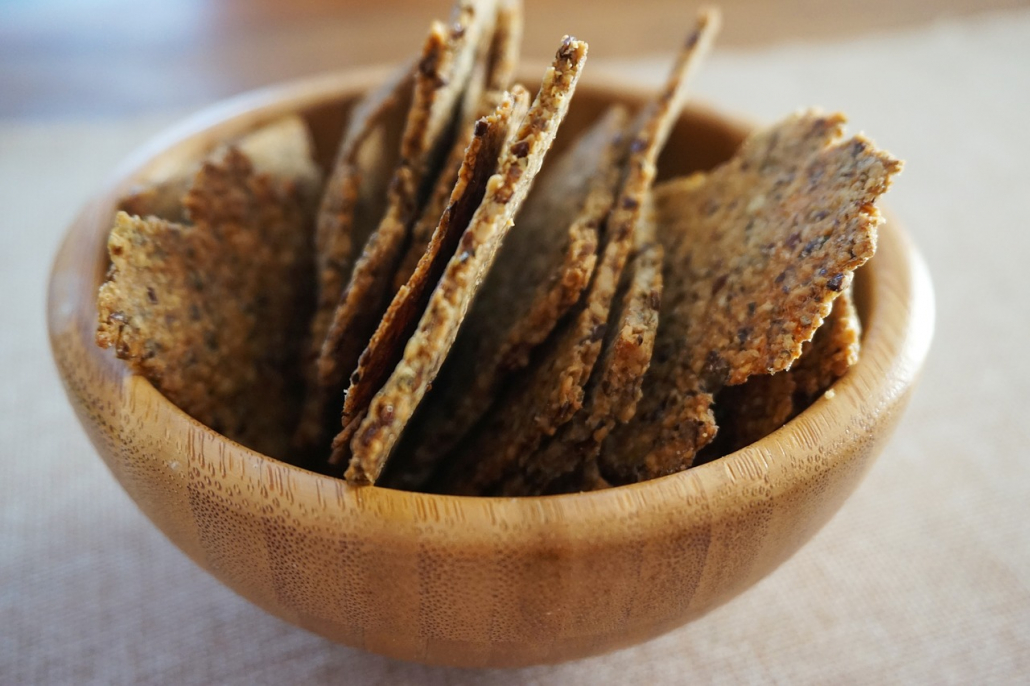
Read Together: Exodus 23:14–17; Leviticus 23:4, 6–8; Acts 2:36–38; I John 3:4; 1 Corinthians 15:3; John 6:35, 47–51; Romans 12:2; Ephesians 4:11–16; John 6:57–58.
Discuss:
- Talk with your child about sin. Explain that the Ten Commandments are the foundation for all of God’s laws. We are to obey all of the Commandments, even those we may feel are the least important (Matthew 5:19).
- Talk with your child about repentance. Explain that repentance is more than being sorry. It means that with God’s help, we stop committing the offense.
- Ask your student what is his/her favorite thing about the Days of Unleavened Bread. Is it getting together with friends on the Holy Days or perhaps a special treat that is only baked at that time? Share what you enjoy about that time.
Review Memorization:
Romans 5:10 “For if when we were enemies we were reconciled to God through the death of His son, much more, having been reconciled, we shall be saved by His life.”
Children’s Bible Program – Level 2: Lesson 23 “Putting Sin Out”
/in LivingEd - YouthRead Together: When God delivered ancient Israel from Egypt, they left in a hurry. They left so quickly that they were unable to let their dough rise, so their bread was unleavened. God told Israel they were to remember the day that He brought them out of Egypt by observing the Feast of Unleavened Bread for seven days. The first and last days of the feast were to be Holy Days or annual Sabbaths. As they prepared for these days they were to remove all the leavening from their homes. God commanded the Israelites to do this and instruct their children to pass on this command to the next generation. But we understand that the command applies to us as members of the church of God also. You have probably helped your parents clean the leavening from your home before the Days of Unleavened Bread each year. It can take a lot of time and hard work! But, why is it important? Here’s the answer.
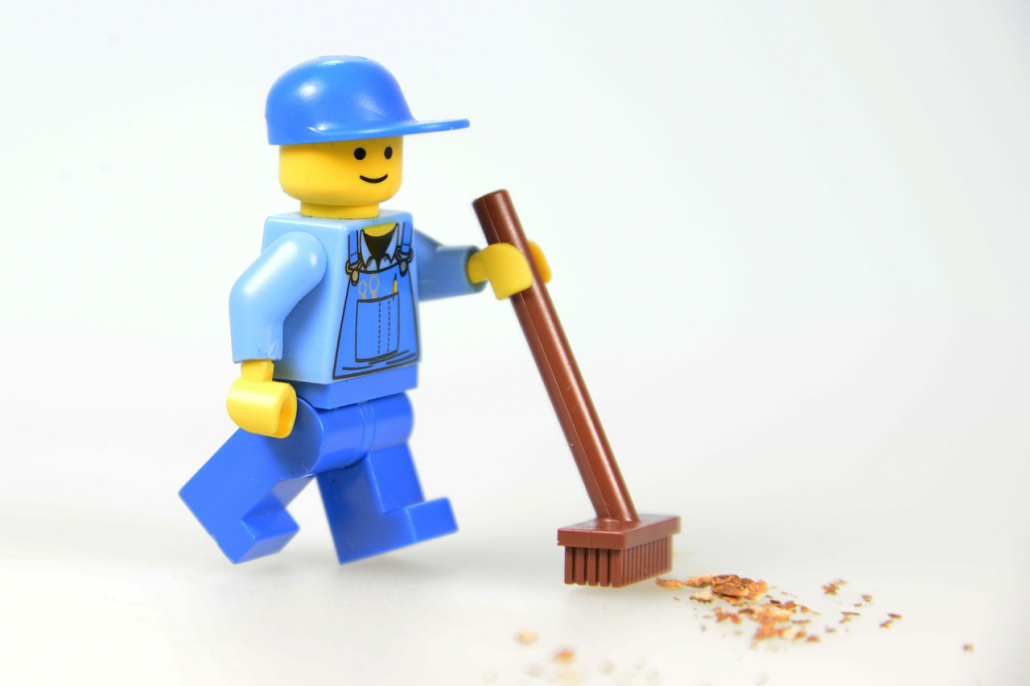
Remember, God brought ancient Israel out of slavery in Egypt. For the Israelites, Egypt represented the years of slavery they had endured. Today, God calls each member of His church and frees them from slavery also. But our slavery is not to the kingdom of Egypt. Our slavery is to sin. Even though we don’t want to, we sometimes break God’s law out of rebelliousness and selfishness. That is like being a slave of sin. For us, God uses leaven to represent our slavery. What is leaven? Leaven is the yeast that is added to bread to make it rise, which makes it more enjoyable to eat. Without that leaven, bread is hard and flat. Just like the yeast that makes bread rise, sin causes us to grow in pride, vanity and selfishness. And as we remove leavening or any bread that has been made with leavening from our homes, we are practicing an exercise that reminds us of removing sin from our life!
Read Together: Exodus 12:15–17, 33–34, 39; 13:3–10; Leviticus 23:6–8; John 6:44; Matthew 16:6; 1 Corinthians 13:4; 5:6–8; Romans 6:12–14
Discuss:
- Help your child name some leavened products that you are to throw out and avoid during the Days of Unleavened Bread.
- Discuss with your child what sin is and have them read 1 John 3:4 (KJV). Help your child recognize that just as we are to carefully stay away from leavening during the Days of Unleavened Bread, we are to be especially diligent to keep sin out of our lives.
- Try to think of a humorous event that happened to your family during the Days of Unleavened Bread. What was the oddest place that you found leavening? Were you ever in a situation where you temporarily forgot it was the Days of Unleavened Bread? What do you do when these things happen? Help your child to understand that when we repent of sin, God is quick to forgive us. This is how we remain unleavened.
Review Memorization:
1 Corinthians 5:7 “Therefore purge out the old leaven, that you may be a new lump, since you truly are unleavened. For indeed Christ, our Passover, was sacrificed for us.”
